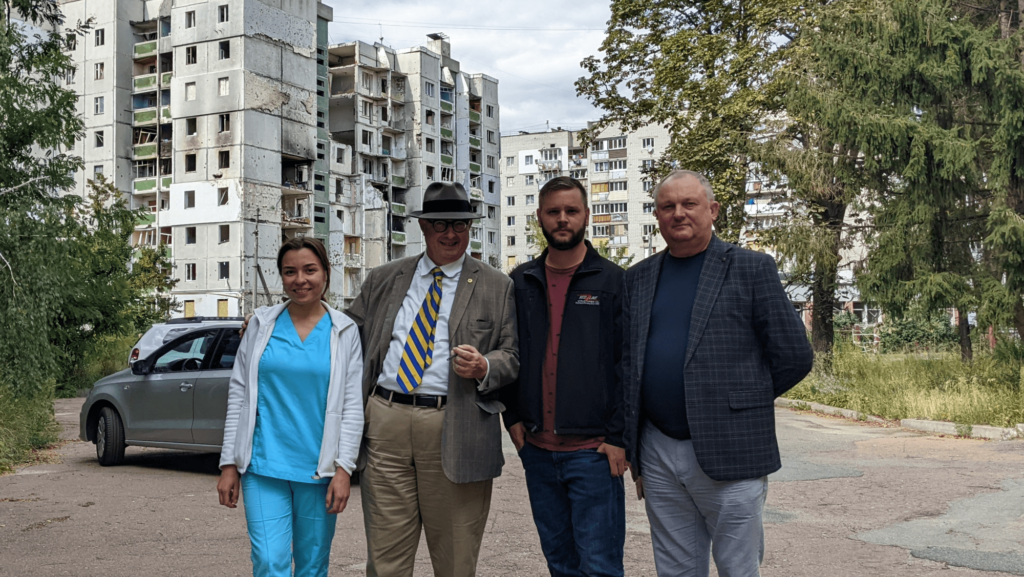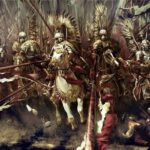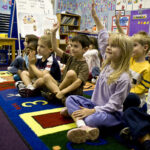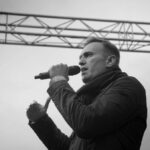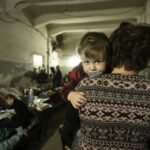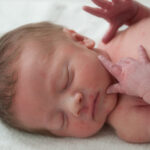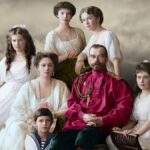Historical Essays, Travel Journalism
Travels with Charles
Six months after the Russian invasion, I meet Charles Coloumbe at his apartment outside Vienna for our trip to Ukraine. We have never met, coordinating our trip entirely over Zoom. He is wearing a gray suit, bowtie, and fedora, and my first impression is that he is a journalist of the old school—Jimmy Stewart in The Philadelphia Story, perhaps. As it turns out, he is many things—a former comedian from Los Angeles, a biographer, a columnist, a podcaster, and an American monarchist. I am soon convinced that he was invented by P.G. Wodehouse, with an air of exiled aristocracy emphasized by a bewildering accent and an uproarious laugh, or perhaps an affable colonial during the dying days of the British Raj. Charles, I discover, has decided he does not like this century, and thus will not be living in it.
We meet our driver Victor in Uzhhorod and get along with Google Translate. Victor tells us that he speaks no German, French, or English, and Charles decides to bellow at him in all three with the occasional Ukrainian term tossed in for good measure, pitching words lustily against the language barrier. English is occasionally utilized in a Soviet-sounding accent, as if that might help. All of this is done at an incredible volume, as Charles has a hearing problem. As we hit the road, Victor decides that in honour of the mission, literary names are in order. Thus: Victor Hugo, Charles Dickens, and Jonathan Swift. Charles laughs explosively in delight: “A troika!” We decide to choose a term that is not Russian instead.
In Lviv, Charles’s first choice for breakfast—the Vienna Coffee House—is closed, so we settle into the restaurant of Lviv’s Grand Hotel. He beams at us. “I have spent much of my life in places like this,” he says. I am not surprised. His stream of fascinating stories is encrusted with royalty. A Count Tolstoy comes up several times; he is the confidante of several Habsburgs. He was even invited to Princess Diana’s memorial in Los Angeles—he attempted to demur out of loyalty to the Queen but was urged to attend by the British consul as a personal favor. He was seated five rows from the front, and Michael Jackson and his entourage soon entered through a side door. “Where’s Bubbles?” his friend asked. “Unlike Her Majesty, Bubbles is being allowed to mourn in private,” Charles responded archly.
On the drive to Kyiv, we see signs of the war everywhere. Anti-tank barricades and barbed wire and bunkers line the highways, and occasionally we pass a smashed-up gas station or house leveled by bombs. It reminds Charles of the scenes on 9/11 in Washington, D.C. He was on a bus heading for the Capitol to host a tour. The bus jolted to a stop so suddenly he thought they’d rear-ended somebody. Ahead was a column of smoke and flame. The radio came on: “The FAA has been ordered to shoot down any flights in American airspace.” Everyone sat in stunned and sickened silence. “It was unthinkable,” Charles tells us. “Have we been invaded? Who could have invaded us?” And he stares out the car window at the wreckage, shaking his head.
Upon arriving in Kyiv, we find our Airbnb lodgings are extremely cheap, as tourists prefer destinations where sightseeing is uninterrupted by air raid sirens. If sirens sounded during the night, I would not have been able to hear them. The snores emitted by Charles are truly phenomenal—whistles, snorts, and gasps that sound as if he is in a death struggle with a strangler who is large enough to grasp his neck but not powerful enough to finish him off. I cram ear plugs so far into my ear canals that I suspect surgery might be necessary to remove them, and this almost works until Victor shifts on his cot and oxygen shrieks through his nostrils, as well. At one point the pair sound remarkably like a pod of orcas, communicating through otherworldly and disturbing noises. Charles inquires solicitously about the quality of my sleep in the morning. I have nothing to report.
We head for the Bucha to see where the bombings and battles took place a few months before. I conduct interviews, furiously scribbling, recording and typing reports on my laptop back in the car. Charles, I notice, is taking no notes. He makes loud sympathetic noises as a doctor tells us about the Russian atrocities and points out where his brother’s apartment was leveled by artillery. At one point, exhausted from traipsing about in the wreckage of bombed-out buildings in his dress shoes, Charles falls asleep just as the doctor describes some particularly horrifying details. As silence descends on the car and Victor and I listen intently, gentle snoring comes from the front seat. We pass a restaurant reduced to rubble. “No lunch today,” says Victor, in English, and he and the doctor laugh. I am not sure if I am allowed to and settle for a worried smile.
Isoon realize what makes Charles so different from other journalists I have met: an utter lack of cynicism. His sincerity is so genuine that it catches me off-guard at first—my generation finds such openness suspicious. Charles emits empathetic murmurs during interviews that often have those we are speaking to instinctively directing their stories at him; he nods at all the right places; he sometimes weeps, shaking his head, saying “awful, awful.” Despite his constant jokes and stories, his inability to be deceptive is disarming, and people gravitate towards him because he is so clearly a man in whom there is no guile. As I scribble, I ask him what angle he’d like to take in his own reporting. Charles waves his hand. “This is your war, my boy,” he says. I look at him to see if he is joking. He is not.
The following day we tour Chernihiv, which was recently liberated. We’re barely twenty minutes out of the capital when the landscape turns into bomb-battered houses. Victor tells us that before the war, he had been planning to buy a house in the area because it was so cheap. There are roadblocks and our passports are checked—soldiers flip through to see where we’ve been recently before handing them back and waving us through. A burned bus is pushed off the road and tipped over. Other places are completely untouched. We weave through concrete blocks placed across the highway. One of them has a slogan painted on it in English: “Keep calm and fight for Ukraine.” Victor listens to war updates on the radio constantly and updates us via Google Translate—he is also picking up English words from Charles, who refuses to allow the language barrier to interfere with his determination to tell very long jokes.
It is interesting to discover how fast we get used to war as a backdrop. The first time we see anti-tank barricades and bunkers and roadblocks, it is jarring. The second time, a sober reminder. The third or fourth, simply scenery. Charles tells us about the veterans of other wars he has known, including two veterans of the Spanish-American War (I initially think he must be talking about the Spanish Civil War but no—the 1898 one) and an exiled White Russian aristocrat, who remembered being blown off his horse during a cavalry charge and awakening to find Tsar Nicholas II pinning a medal to his chest. Charles, it turns out, not only knows scores of minor royals, but also knew many people who saw the great events and great men of the 20th century up close. When I observe this, he promptly tells me about the three times he met Ronald Reagan, who despite only meeting him in a handshake lineup was able to recall his name by the second time they met. I am not surprised.
READ THE REST OF THIS COLUMN HERE


